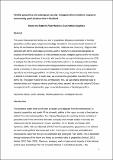Familial geopolitics and ontological security : intergenerational relations, migration and minority youth (in)securities in Scotland
Abstract
This paper discusses the family as a site of geopolitics. Bridging scholarship in feminist geopolitics, political psychology and sociology, we explore the psycho-social dynamics of family life and theorise the family as a multi-scalar, relational site of security. Original data collected with ethnic and religious minority youth in Scotland are presented alongside an analysis of how family relations, at interconnected scales, mitigate against and/or re-inscribe broad geopolitical narratives of security. We employ the concept of ontological security (OS) to analyse the role of the family, and the relationships within it, on shaping youth securities. We discuss (1) how family histories and intergenerational experience shape young people’s sense of security; (2) how young people negotiate and resist family norms and values that reproduce securitizing geopolitical narratives; and (3) how young people find security when family is absent or indeterminate. In each case, we analyse how geopolitics operates through family life. The paper makes two key contributions: first, we use original empirical data to theorise ethnic and religious minority youth securities; second, we show the value of OS as a conceptual tool for understanding psycho-social dimensions of familial geopolitics.
Citation
Botterill , K , Hopkins , P & Sanghera , G 2020 , ' Familial geopolitics and ontological security : intergenerational relations, migration and minority youth (in)securities in Scotland ' , Geopolitics , vol. 25 , no. 5 , pp. 1138-1163 . https://doi.org/10.1080/14650045.2018.1512098
Publication
Geopolitics
Status
Peer reviewed
ISSN
1465-0045Type
Journal article
Collections
Items in the St Andrews Research Repository are protected by copyright, with all rights reserved, unless otherwise indicated.

